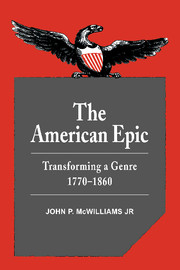Summary
The epic and the novel, these two major forms of great epic literature, differ from one another not by their authors' fundamental intentions but by the given historico-philosophical realities with which the authors were confronted. The novel is the epic of an age in which the extensive totality of life is no longer directly given, in which the immanence of meaning in life has become a problem, yet which still thinks in terms of totality. It would be superficial – a matter of mere artistic technicality – to look for the only and decisive genre-defining criterion in the question of whether a work is written in verse or prose.
George Lukacs, The Theory of the Novel (1914)To create some kind of heroic song for the New World remained a pressing cultural need from the time the Republic was formed until the time it was severed, yet the history of this initially embarrassing quest has not yet been written. This neglect is not justified, but it has surely been understandable. Readers with New Critical assumptions about literary art have scarcely been able to endure the poems of Timothy Dwight and Joel Barlow. No one, to my knowledge, has yet even considered the many later attempts to wrench a “Homeric” verse epic out of American experience. Dogged patience is sometimes needed to read them; to write about them depletes one's resources of humor. Moreover, much of the debate over the substance and style of the American epic was carried on in literary periodicals that appeared, and usually foundered, between the Revolution and the Civil War. As long as the American epic is seen as a closed couplet cul-de-sac, a cemetery for long patriotic poems, the debate cannot seem worth the exhumation.
I shall contend that the American epic did not expire in the first quarter of the nineteenth century only to be revived, in troublingly imagistic form, by such dissimilar poets as Pound, Crane, and Williams a century later. The disgrace of the imitative verse epic led authors to portray American heroic subjects in new literary forms more engaging to contemporary readers. If we mercifully except Hiawatha, Whitman's Leaves of Grass is still the one work commonly believed to have fulfilled this end. Perhaps now, however, America's heroic leaves might be looked for under someone else's bootsoles.
- Type
- Chapter
- Information
- The American EpicTransforming a Genre, 1770–1860, pp. 1 - 12Publisher: Cambridge University PressPrint publication year: 1989

